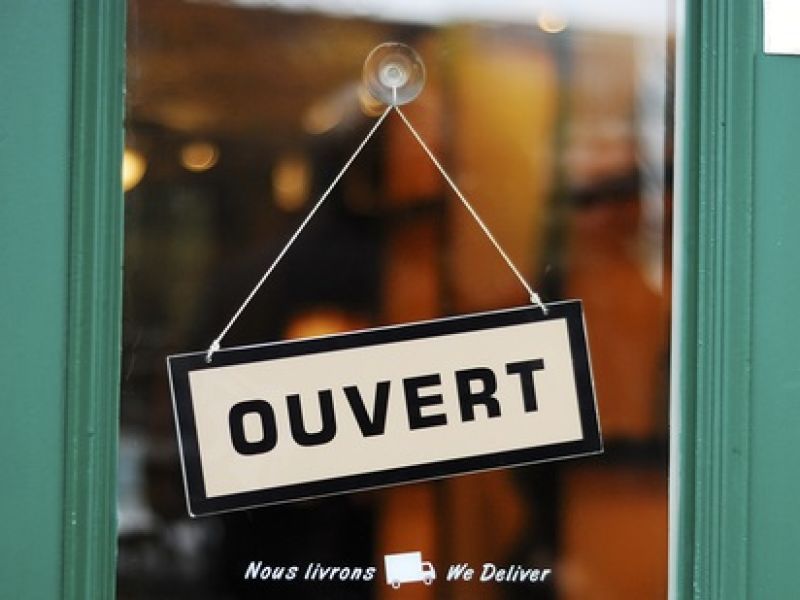After two years of travel limitations, holidays are at the forefront of many people’s minds. Yet the rush to major destinations has also led people to embrace quieter and more comfortable options. Chief among these is glamping, or ‘glamorous camping’ - holidays that embrace nature while also providing luxurious, resort-style amenities.
There are few better glamping destinations than France, with its stunning countryside, fantastic food and drink, and reputation for romance and relaxation. All of this makes it a great time to consider starting your own glamping business in France. Here’s everything you need to know, from business fundamentals to the essentials of any glamping business.
What is glamping?
Glamping is a portmanteau of the words ‘glamorous’ and ‘camping’ - and it’s exactly what it sounds like. Instead of pitching a tiny tent in the middle of nowhere, glampers are treated to spacious and well-equipped tents, yurts and huts. These semi-permanent accommodations are small enough to nestle within pristine natural areas, but big enough to host real beds, decor, and even entertainment.
Related article: Start a business in France in 8 steps
Glamping combines the desire to escape to the countryside and enjoy the experience of camping with the no-hassle approach of a package holiday. Glamping tents often form small villages in rural areas, with paths to nearby amenities such as pools, hot tubs and private sanitation. While there’s still a degree of self-sufficiency and autonomy involved, glampers can enjoy many of the benefits of camping without having to worry about the practicalities.
Why start a glamping business in France?
France is already one of the world’s most popular glamping destinations. This growing industry has found a natural home in France’s foothills and forests, from the rugged beauty of the Pyrenees to the sun-soaked south. Glampers in France can enjoy stunning views, clean air, incredible walking and hiking routes, and fantastic food from on-site restaurants, among a myriad of other benefits.
Related article: How to start a holiday cottage business in France
As for why you should start a glamping business in France - there’s never been a better time! The end of the pandemic has started a travel boom that is likely to last for some years to come. With France already being the world’s favourite tourist destination, and the popularity of glamping continuing to grow, glamping is among the most exciting tourism business ventures you can undertake. So here at some things to consider when starting a glamping business:
Location
Holidaymakers are always drawn to the south of France, but it isn’t the only picturesque place in the country. Glampers in particular are drawn to rural areas teeming with natural beauty, and these exist across the country. The national parks alone give you plenty of options, whether it’s the Millevaches in central France or Loire-Anjou-Touraine in the west. For more advice on location, take a look at our articles Where’s the best place to start a business in the South of France and for those that prefer northern France Where’s the best place to start a business in the North of France.
Target market
Glamping has a reputation as a bit of a ‘yuppie’ pursuit, but it’s fast outgrowing that stereotype. Drawing from both traditional campers and families looking for a quiet retreat, glamping now spans the whole spectrum of holiday-goers. While you can try to cater to as wide an audience as possible, it often makes more sense for a small business to limit itself to one market, and deliver an experience that’s tailored to their enjoyment.
Local regulations
Owning a piece of land in France doesn’t mean you’re entitled to build there. The first thing to note is the local planning models, usually classified as a PLU (Plan Local d’Urbanisme), POS (Plan d’Occupation des Sols) or CC (Carte Communale), depending on the area. These may have specific clauses preventing the construction of campsites in given areas. In the absence of a local model, permission tends to be easier to secure the closer to an existing settlement you are.
There are also national regulations to consider. These include broad factors such as vehicular access, waste treatment and access to utilities, as well as more specific factors, such as how many people your glamping site will host. ‘Camping à la ferme’ regulations govern sites of up to six pitches and 20 simultaneous visitors; any more than this requires a different application process with more regulatory hurdles and checks.
Starting a glamping business in France
Starting a glamping business in France is much like starting any other business - albeit with a few unique considerations. While France has a reputation as a challenging place to start and grow a business, recent changes have made it much more attractive. Here’s everything you need to know about starting a glamping business in France, from writing your business plan to finding a suitable site.
Step 1: Write your business plan
The first step when starting any business is always to write a business plan. This will not only give you and any partners a sense of what your business will be and where it will go, but also help you to secure investments. As a French business, you’ll also need it to open a French bank account, and give your French bank manager the confidence that you will run your business sensibly, and have a plan for a range of possible scenarios.
Try to outline your mission statement and your vision for the future in your business plan, along with what it is you plan to offer, and who your glamping business is targeted at. These last two will often go hand in hand - if you’re targeting young couples, it would make sense to offer childcare or suitable entertainment on site. You should also include any relevant business experience in your leadership team here, as well as your predicted expenditure, and any money you or your partners will be investing in the business.
Your business plan is a mandatory part of the French formation process, but it’s also a document you can return to and rely on. By defining exactly what your business will be and do - the services you plan to offer, the locations you’re considering, how you intend to scale the business - you will have a plan to proceed with, a point of reference when making key decisions, and something to return to if you ever find yourself straying off course. For more detailed advice on a business plan, take a look at our article with business plan tips from a French entrepreneur who really knows her stuff.
Step 2: Define your company structure & by-laws
Next you’ll need to define your company structure. This will generally depend on the ownership arrangement of the business. There are three common structures in France:
● SARL
A SARL is a private company structure, roughly equivalent to a limited company (Ltd) in the UK, and provides similar protections and responsibilities. This is the most common structure for new businesses looking to establish themselves in France.
● SAS
Short for Simplified Stock Company (in French), the SAS company structure is ideal for a joint venture between a French company and a foreign partner. This would be a good choice if you intend to create a new glamping business in coordination with a French company, who may have the local expertise you need to realise your ambitions.
● Branch
The Branch company structure works in much the same way as it does in other countries. This structure is ideal for an existing glamping business that may be looking to expand into France, having succeeded in the UK! If you’re unsure about which company structure is the best fit for your business, we recommend talking to a formation specialist. For more in-depth details on French business structures, take a look at our article What's the difference between a SARL, SAS, SA, EURL, Micro-Entreprise & Auto-Entrepreneur?
Once you’ve picked a company structure, you’ll need to register your by-laws. These should include information about your company structure, the sector you intend to operate in, and how you expect your business to develop over the next few years. These documents will be in French, and should be submitted by either a lawyer or a company formation agent.
Step 3: Open a bank account
Once you’ve formulated a plan for your glamping business, you can open a business bank account. This can be the trickiest part of starting a business in France, as French banks tend to be fairly strict, and most will not have any English language proficiency. An intermediary such as a formation agent is recommended to introduce you, help you work through your business plan, and answer any questions the bank may have.
You’ll also need to deposit some share capital, usually at least €4000. Your share capital won’t be accessible until about two weeks after the banker receives your company certificate, known as a K-bis. This share capital is a deposit rather than a down payment, so you should get it back if you don’t end up completing the formation process. Here’s a useful article on French banks and business banking and how to get a French bank manager on your side.
Step 4: Gain legal publicity
One of the less familiar steps in starting a French glamping business is legal publicity. Under French law, all new companies are required to publish a notice of incorporation in an authorised newspaper, such as Le Figaro or Le Monde. Thankfully, you should be able to complete this step online, at a cost of €5.50 + VAT per line of text.
Step 5: Incorporate your business
Once your documents are complete, you can file your application with the Centre for Company Formalities (CFE). While they will generally then forward your application onto the relevant departments to be stamped and authorised, it may be necessary to contact your local tax office or chamber of commerce to complete this process.
Step 6: Register your business
Assuming that your application was successful, you should receive your K-bis (certificate of incorporation) shortly afterwards, though the time will vary depending on whether additional information is required. This will include your registered number and your company ID number, which you’ll need to include on all of your official documents and invoices.
Once you’ve received your K-bis, your bank manager will be able to activate your business bank account and release your share capital. This will be followed by a welcome letter from the tax office with your VAT number, and the contact details for your local tax officer.
Step 7: Obtain planning permission
As a registered business, you can now acquire the permission you will need to construct your glamping site. Ideally you will have done some preparation for this much earlier when you acquire the land, and draft your business plan. It’s generally advisable to plan for a small site, and to pay close attention to where local regulations allow you to develop.
Some areas will have areas earmarked for campsite development, while others will fall under national regulations. In the latter case, you are more likely to be successful in gaining permission to develop the closer you are to an existing settlement, and less likely if your land is in remote and pristine countryside. A French legal expert will be able to advise you on obtaining planning permission, and the viability of a given area for a glamping site.
Step 8: Hire an accountant
The final (and perhaps most important) step is to appoint a professional French accountant, known as an ‘expert comptable’. While improvements have been made in recent years, French tax law is still notoriously complicated, and an accountant is highly recommended.
A regulated accountant is obliged to keep you informed about changes to French tax law, and will be held legally responsible for the good standing of your accounts. They can also help you to submit VAT returns and payrolls, all vitally important for a successful glamping business.
--
Starting a glamping business in France is an exciting prospect, but not one without challenges to overcome. We have a free brochure for you to download below, with even more detailed advice on how to start your business in France. And if you require expert help, we can take care of the whole company formation process for you, including bank accounts, registering your business and finding you an English-speaking chartered accountant. Don’t hesitate to reach out to us today via our contact page. We’ll be happy to help you.







